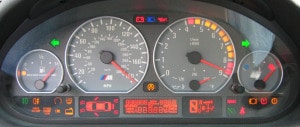
Many people do not know what all the warning lights on their instrument panels mean – or more importantly – what to do if they illuminate. These lights often need immediate attention, as they are usually telling you that something is wrong. It could mean that conditions are unsafe for you and your passengers, or that something is happening that can damage your vehicle. The following list is not an exhaustive one. Every driver should be familiar with all the warning lights on their particular vehicle.
 Low Tire Pressure Warning
Low Tire Pressure Warning
Most modern automobiles (and all vehicles sold in the US after 2005) consistently monitor the pressure of each tire, and warn you when there is a pressure drop. When the low tire pressure light comes on, you should pull over to a safe place and visually inspect the tires.
If your tires are not inflated properly all aspects of your vehicle’s handling are negatively affected. Also, driving with either low or overly-inflated tires adversely affects fuel economy and causes premature wear on your tires.
It’s common to see the low tire pressure warning light in the fall and winter when outdoor temperatures drop, resulting in a reduction of tire pressure. See our other blog for more information: Why did my tire pressure monitor system warning tpms light come on?
A good rule of thumb is to check fluid levels and tire pressure once a month (including the spare). Driving on a flat tire is dangerous and can result in damage to the both the tire and the wheel. Call for roadside service or change the tire. Midwest Performance Cars is always happy to check and set your tire pressures at no charge.
 Low Battery Warning
Low Battery Warning
When the low battery warning light comes on, it’s a good idea to have the charging system checked immediately. Often this indicates the alternator is not charging the battery properly, which can easily leave you stranded the next time you try to start your car. You should also check the terminals to ensure they are tight and free of corrosion. This light typically will NOT tell you that the battery itself is failing. Indications of a bad battery are – your car turning over slowly at start, or not turning over at all. In the midwest, with the hot summers and cold winters, modern batteries typically last 4-5 years. Midwest Performance Cars can check the condition of your battery as well as test your charging system.
 Brake Fluid Warning
Brake Fluid Warning
An automobile’s brake system is the most important safety feature of the car. Never ignore a brake warning light. This warning light can indicate a fluid leak – and a resulting lack of stopping power. Brake failure can be life-threatening for you, your passengers, other drivers and pedestrians.
If the brake light is on, check the emergency brake to ensure it isn’t engaged. If the light remains on after disengaging the emergency brake, check the brake fluid. If low, add brake fluid up to the line indicated on the brake master cylinder, and pump thebrakes several times. If you feel the brake pedal “going down” and “getting soft”, you most likely have a brake fluid leak.
Any time brake issues are suspect, the safest option is to have the automobile towed to our auto repair shop, Midwest Performance Cars, and have the brake system inspected. If the brake system is losing fluid it is absolutely unsafe to drive the vehicle. When this light turns on, don’t risk it. Have the vehicle towed to our shop.
 Brake Pad Warning
Brake Pad Warning
Many vehicles have a separate warning light for the brake pads. When you use your brakes, the brake pads clamp down on the brake discs and the generated friction slows the car. As this happens, a small fraction of the pad material wears away. Over time, the pads wear down until a sensor in the pad hits the disc and turns on the Brake Pad Warning light. This is an indication that you need to have your brake pads, and sometimes rotors, replaced. You have a fairly short amount of time before the pad material wears away completely and the brakes cease to slow your vehicle. When you see this light, call Midwest Performance Cars. We will be happy to inspect your braking system at no charge.
 Oil Pressure Warning
Oil Pressure Warning
Oil is a lubricant that reduces the friction and resulting wear on a car’s engine. The engine is the most costly component of an automobile, therefore it is important to keep it lubricated. This is also the reason periodic oil changes are vital. Over time, the oil wears out and is unable to lubricate properly, resulting in the premature engine wear.
An illuminated oil pressure light can indicate any one of several oil-related problems. Some of these are: an oil leak, a bad sensor, or your engine burning oil. Whatever the cause, this light requires immediate action. Pull over to a service station and check your oil level. If oil level is low, check your owner’s manual and top up with the correct weight oil until the engine is filled correctly. NOTE: DO NOT OVERFILL – too much oil can also harm your engine.
Get your vehicle to your mechanic as soon as possible – even if adding the oil causes the light to go off. Midwest Performance Cars will be happy to find the cause of the trouble.
 Temperature Warning
Temperature Warning
An illuminated temperature warning light can indicate your car has a coolant leak, bad water pump or faulty thermostat. While there are other potential causes, these are the most common. Driving an overheating car can result in damage to the engine which may or may not be repairable. Never open the radiator cap on a hot car, severe injury from scalding fluids can result. Have your car towed to Midwest Performance Cars, for diagnosis and repair by one of our certified mechanics.
Midwest Performance Cars is happy to advise you on any warning light issue and perform a complete vehicle safety check at no charge. Call us at (312) 432-9492 to set up an appointment or use our convenient online scheduler.








 Low Tire Pressure Warning
Low Tire Pressure Warning  Low Battery Warning
Low Battery Warning Brake Fluid Warning
Brake Fluid Warning Oil Pressure Warning
Oil Pressure Warning Temperature Warning
Temperature Warning